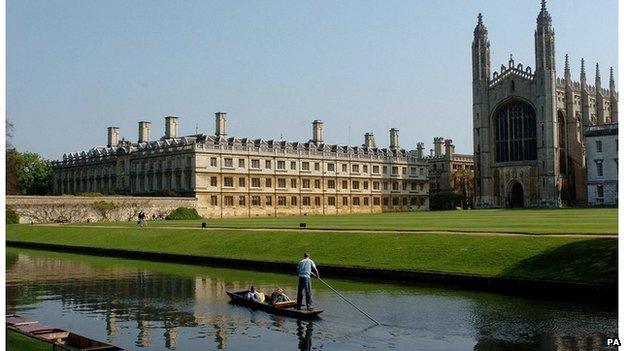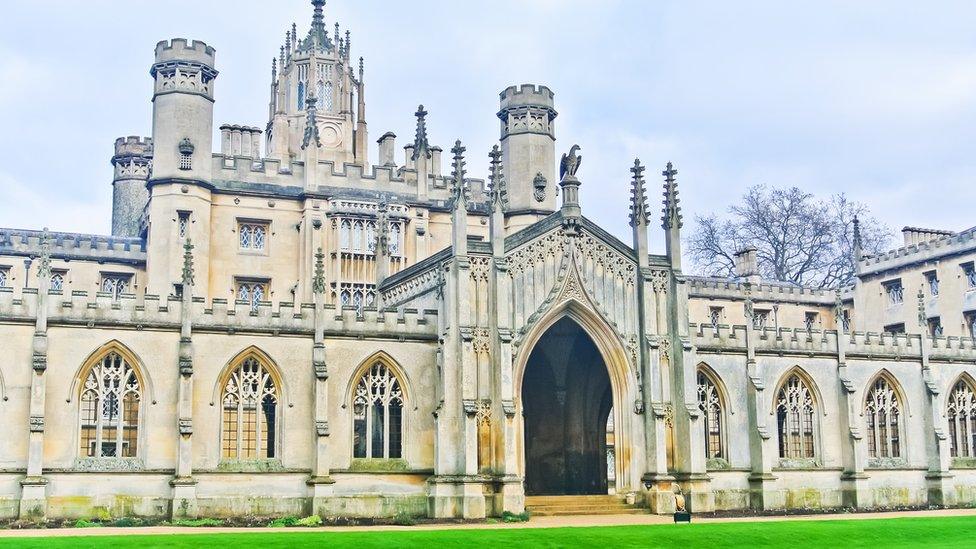Oxbridge college admissions 'complex and intimidating'
- Published

The trust says there is "significant complexity" in the admissions system to both universities
The way students are admitted to Oxford and Cambridge universities is complex and intimidating, says a charity that champions social mobility in education.
The Sutton Trust says Oxbridge should simplify the process to help those from schools and homes not familiar with it.
The universities accused the trust of making "unjustified criticisms" and perpetuating "common myths".
The report comes after David Cameron warned top institutions they needed to do more to tackle social inequality.
The Sutton Trust says would-be undergraduates at Oxford and Cambridge have to undergo different interviews, tests and written assessments depending on the course and college to which they are applying.

"Both universities evaluate many different aspects of a prospective student's application in great detail," the report, Oxbridge Admissions, says.
"But this means that there is significant complexity in the admissions system to both universities, which can seem off-putting to students unfamiliar with the process who may have little support from their schools."
It also warns that interviews "can be intimidating for young people, not least to those who have not had significant preparation and support to prepare".
College place
The Sutton Trust report highlights a number of issues it says make the current admissions procedure complicated. For example:
Students cannot apply to both universities, which, the trust says, "in the UK, is unique to Oxbridge, and is not seen at all at Ivy League universities"
They are still required to complete a Ucas admissions form
Students have to win a place at a college to study at the university
Applications to the colleges must be received by 15 October each year - earlier than other degree courses except medicine, dentistry and veterinary science
Applicants must apply to a chosen college or submit an "open" application
Both universities operate a "pool" system, where applicants to colleges over-subscribed with good candidates are considered by other colleges
The Sutton Trust report comes just days after Cambridge University announced would-be undergraduates would have to sit written tests as part of the application process.
The university said the aim was to maintain fairness during changes to the qualification system in England.

Responding to the report, a spokesman for Cambridge University said the university had worked closely with the Sutton Trust to widen participation.
"We are therefore disappointed that this report demonstrates a lack of understanding of our admissions process and makes a series of incorrect and unjustified criticisms and recommendations," he said.
"We have a proven track record of improving access. We are committed to widening participation whilst maintaining high academic standards.
"We continually review our admissions processes and the effectiveness of our extensive widening participation work."
A spokeswoman for Oxford University said: "We are disappointed that one of our longstanding access partners is actively perpetuating some of the most common myths about how the selection process works.
"These myths are a fundamental barrier to Oxford's access work, and only reinforce perceptions that deter exactly those candidates we try hardest to encourage to apply."
She said Oxford was committed to transparency and self-scrutiny and reviewed its selection criteria and admissions policies on an "ongoing basis".
"Oxford is interested not just in demonstrated ability but academic potential, and admissions tutors carefully consider not just candidates' achievements but the context in which they occur when making offers," she said.

Sir Peter Lampl, who chairs the Sutton Trust, said: "Our surveys and experience suggest that many bright state school students are put off by the application process, which is both intimidating and complex.
"Specifically, we believe that the universities rather than the colleges should control the admissions policies and interviews.
"The numbers of additional exams and tests should be reviewed, again to avoid advantaging those who gain from extra tuition and support.
"More should be done to consider contextual admissions, recognising how much harder it can be for a bright student in a tough inner city school than in a successful private or state school."